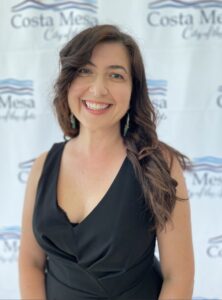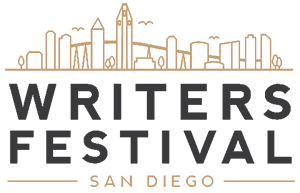Interview by Diane Gottlieb
Diane: Congratulations on your wonderful book “All the Bad Girls Wear Russian Accents” and on your winning the 2024 San Diego Writer’s Festival Poetry Collection of the Year! You’re a woman of several countries and languages. In the first poem of the collection you say, “I’m still looking/to find the word for where I come from.” How is language tied to that discovery?
Jane: Thank you! It’s been wonderful to have this reception of my book, which, as you say, explores how we make meaning across different languages and identities. I think when we are able to name something, to put into words a feeling or situation, it is an act of understanding it, of categorizing it as one thing and not another. When we then share it with others, we are translating that understanding. The answer to the question of “where do I come from?” can have many layers – “I come from Lviv, Ukraine, I come from a place of love, I come from the Jewish people… etc.” A lot of us try to understand in what soil we grew, what seeded our beginnings, so that we can more fully articulate and unfold our own story.Language is how we share and translate those stories to ourselves and to others.
Diane: A few of the poems are about coming to the United States as a refugee. Can you share just a little bit about that experience?
Jane: We escaped Soviet Ukraine, fleeing antisemitism and political persecution, rightbefore the Soviet Union crumbled. I was ten. That next year, 1989, the Berlin Wall fell. It really felt like escape. It was like anytime now, the door could close, the train could leave without us being on it. “It Matters Where You Live,” one of the poems in the book, speaks about being on the train and not knowing what waited for us – Execution? Freedom? There was also a limit on what we could take out of the country, to help us survive wherever it was—only a small number of bags. My parents took books, which for me was so precious.
Diane: The collection feels very much about the strength of women and all the roleswomen have to play.
Jane: As the title suggests, there’s an irreverence to this book. It refuses to hold any one idea of what a woman can be, of what a story can be. The poem “All the Bad Girls Wear Russian Accents” looks back to my school years, when I was trying to have that sense of belonging and bravado. But also, I was being called out constantly for being different, and the prevailing understanding of who I was, wasfetishized. The poem brings a wry sense of humor to finding strength in a position I didn’t choose. The poem “Stilettos Over Grass Plots” also has a sharp feminine edge. It touches on the immigrant culture of women dressing ostentatiously, even at somber occasions like funerals.
That’s the other thing I wanted to offer—genuine joy, hope. I did not want to make poems that left you thinking, “Well, I’m going to throw myself off a bridge now.” It is such a complicated grief and so full of heartache, the war being waged in my homeland and all the wars and suffering going on now. I wanted poems in which, just like in life, difficulty and hard truth sit side by side with humor and beauty,and love, and good food, and all the things that help us as people make it through. Not by escaping, not by denying the difficulty and the tragedy in the world, but by looking it in the face and moving through it.
Diane: That’s one of the things I love so much about the book. While there is certainly trauma here, the poems don’t live in trauma. Instead, the focus is on resilience.For example, the gorgeous “For Those of Us Forced to Flee” has deep sadness but ends in power.
Jane: That poem connected with many people, especially the last two lines: “Survive/When you have nothing left to plant, become the seed.”
Being Jewish, being immigrants, refugees, there’s a deep connection to both our roots and to all the other people that also built a new life here, in America. Wesurvived when so many of our people didn’t, we have a holy responsibility to be grateful for that life, to look for the good, even if it’s only inside ourselves. And to not give up.
Diane: Going back to “Lviv, Ukraine,” the first poem. You say, “I am only trying to unpack one girl’s worth of beginning.” Did writing these poems help you do that?
Jane: Yes, there was definitely a lot of self-discovery while writing this collection. I had known writing was my calling since I was four, but for many “making a living” reasons, had turned away from it. In my 40s, during the pandemic, I embracedmyself as a writer. I did not set out to write poems about our shared humanity orimmigration. I thought I was writing about the garden, cooking, my daily life.
And then, I discovered that I had enough material for a collection centered on identity and on how we come to make sense of our stories. Writing was my tool to excavate what was waiting for me and maybe I needed to wait all this time for the rest of me to catch up. I also realized how the poems I wrote over that periodbecame more meaningful when placed together, creating the arc of this book.
I end my debut collection with “Yevgenia,” a poem titled after the first word given to me—my name. The poem echoes that initial question of “where I come from.” The title is a little hard to pronounce. I could have called it “figure of speech,” or something else, but I wanted to use a Russian word which was me and wasn’t easy. Life isn’t easy. That is how it is and that’s who I am, and it’s okay and wonderful. I believe this book invites connection. And it’s okay and wonderful ifit doesn’t invite every connection.
Diane: What is next for you?
Jane: Well, of course I am looking forward to the Writers Conference on April 6th and co-hosting two incredible poetry readings and an Open Mic there with the San Diego Poetry Annual.
I am also very excited about my feminist short poetry collection, POWER POINT, coming out May 2024. It combines my MIT education and background in analytics and art with poetics and includes several prize-nominated poems. My publisher, Sheila Na Gig Editions, is offering a 20% pre-order discount for the duration of Women’s History Month and Poetry Month. A portion of the proceeds goes to organizations supporting women, girls, and gender equality.
See Jane at SDWF taking place on April 6th at the Coronado Public Library and Preforming Arts Center. Read more information about the day’s free programming and events here.
 Jane Yevgenia Muschenetz was recognized in 2023 for excellence in Poetry Performance by the County of San Diego. She has appeared on KPBS Midday Edition and in numerous publications. Connect with Jane and her work online at www.PalmFrondZoo.com and @PalmFrondZoo.
Jane Yevgenia Muschenetz was recognized in 2023 for excellence in Poetry Performance by the County of San Diego. She has appeared on KPBS Midday Edition and in numerous publications. Connect with Jane and her work online at www.PalmFrondZoo.com and @PalmFrondZoo.
Diane Gottlieb edited Awakenings: Stories of Body & Consciousness (ELJ Editions) and is the Prose/CNF Editor of Emerge Literary Journal. Her work appears or is forthcoming in Witness, Colorado Review, River Teeth, Florida Review, SmokeLong Quarterly, Best Microfiction, and many other lovely places. Find her at https://dianegottlieb.com and @DianeGotAuthor.




